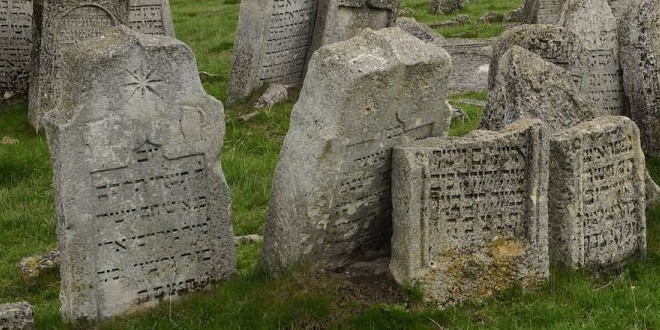Although antisemitism is booming around the world, surprisingly, some good news exists as well The Kantor Center for the Study of Contemporary European Jewry at Tel Aviv University (TAU) has just released its annual review entitled “ Positive Trends in Fighting Antisemitism and Radicalization around the World” and presented it to Israel’s President Isaac Herzog at a special ceremony in the President’s Residence.
The ceremony was held in commemoration of International Holocaust Remembrance Day, January 27 – the day on which the Auschwitz death camp was liberated in 1945.
The Kantor Center was inaugurated in May 2010 at the initiative of Dr. Moshe Kantor, resident of the European Jewish Congress. It provides an academic framework for the interdisciplinary research and academic study of European Jewry from the end of World War II until the present dayon Jewish identity, culture, and demography; the relations between Jews and other national, ethnic, and religious groups; antisemitism, its manifestations, causes, and development; and Holocaust memory in political and social discourses. It also initiates, encourages and coordinates research projects, conferences, seminars and publications in the relevant fields.
Among the positive news are legal precedents in the battle against antisemitism; enhanced resources to protect Jewish communities; expanded restoration of Jewish cemeteries; top sports teams joining the battle against antisemitism; and the Arab World’s first Holocaust memorial exhibition opened in 2021.
In the cultural arena, there has been a rising trend of restoring Jewish cemeteries in Eastern Europe, while in Western Europe and North America leading sports associations and teams raised the banner of the fight against antisemitism.
For example, in the small Polish city of Cieszyn, a museum employee, with the help of a teacher at the Evangelical Society School, recruited students for a Jewish cemetery restoration project, as a concrete way to engage with local history and develop intercultural understanding. In Kielce, a city in south-central Poland, high school pupils commemorated the 75th anniversary of a post-WWII anti-Jewish pogrom by cleaning the local Jewish cemetery.
In the village of Chesnyky in Ukraine the local non-Jewish Rosolovska family established a memorial for local Holocaust victims with the support of the United Jewish Community of Ukraine and the Jewish community of Ivano-Frankivsk.
In the legal arena, according to the report, a series of encouraging precedents in fighting antisemitism were set last year that restrained the so-far almost unrestricted dissemination of hate propaganda. One important example was the ruling of the European Court of Human Rights against a Bulgarian MP who had disseminated antisemitic tropes in his books.
In the political and legislative arena, governments around the world increased the resources allocated to protecting Jewish communities, appointed special envoys for fighting antisemitism and adopted the Working Definition of Antisemitism of the International Holocaust Remembrance Alliance (IHRA).
The Canadian government, responding to a sharp rise in antisemitic incidents, launched an action plan – allocating five million dollars to protect Jewish institutions, cemeteries, and monuments, fund education programs, advance legislation and enforcement measures, and promote the adoption of the IHRA definition of antisemitism, among other initiatives.
Prof. Irwin Cotler, Canada’s former minister of justice who currently serves as the country’s special Envoy on Antisemitism, invited Jewish students who have experienced antisemitism on campus to tell their stories at an emergency conference.
Since 2015, and especially over the last two years, more than 800 bodies worldwide have adopted the IHRA definition of antisemitism.
Several European countries have appointed special Envoys – officials tasked with monitoring antisemitism, raising public awareness, and promoting legislation to tackle this abhorrent phenomenon.
In the Middle Eastern arena, the Holocaust was meaningfully addressed for the first time by a public museum in an Arab country (the UAE). Other encouraging steps were also introduced by the governments of the UAE and Bahrain.
The first Jewish school will soon open in Dubai. Abu Dhabi is building the Abrahamic Family House – a joint religious complex including a mosque, a church, and a synagogue of similar height and façade, differing only in their internal design to fit the needs of the different religions. The complex, symbolizing harmony alongside diversity among the three monotheistic faiths, will be completed during 2022.
Hotels in the UAE were instructed to provide kosher food to their Jewish and Israeli guests. Citizens of the UAE and Israel celebrate Muslim and Jewish holidays together, including a joint meal marking both Lag Ba’omer and Iftar (which closes every day of fasting during the month of Ramadan).
At the Jerusalem ceremony, Herzog said: “The global antisemitism crisis is escalating, but the international fight against it is also intensifying. We are witnessing many initiatives for combating antisemitism around the world, and we must encourage and foster these positive trends. Strengthening the light is just as important as fighting darkness. I thank the Kantor Center for its dedicated research and faithful work in monitoring antisemitism worldwide.”
Kantor Center director Prof. Uriya Shavit added: “Discourse on antisemitism and radicalization usually focuses on troubling negative trends. We decided that a positive report, describing encouraging developments and activities, should also be published for three reasons –
expressing appreciation for those already active; impelling more governments and organizations worldwide to initiate similar activities; and promoting a discussion on concrete proposals for improving existing programs.”
The Positive Trends Report was written by a team of seven leading TAU experts from various fields, with policy recommendations formulated in a series of brainstorming sessions. Every chapter in the report ends with a series of recommendations for organizations and governments aiming to enhance their fight against antisemitism.
These include establishing a website that provides comprehensive information and guidance on restoration of Jewish cemeteries in Europe; promoting the teaching of the Holocaust in the Arab world, (dissociated from the context of current events); establishing mechanisms for monitoring governments’ implementation of their pledges to fight antisemitism; and encouraging sports clubs in Eastern Europe to join programs that combat religious intolerance.
The shortcode is missing a valid Donation Form ID attribute.






